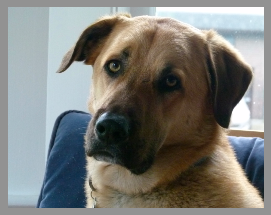 How to let go of a dog you love
#361401 - 05/18/2012 01:02 AM How to let go of a dog you love
#361401 - 05/18/2012 01:02 AM |
Webboard User

Reg: 11-27-2011
Posts: 10
Loc: Washington
 Offline Offline |
|
Hello all, Haven't really used this site to much but i have a bit of a dilemma that i need advise on from unbiased dog lovers.
I have two dogs, a yellow lab and a black lab/german sheppard. The sheppard has aggression issues towards unfamiliar dogs, a recent issue.
I have no experience with aggression and after many many hours of thought i have come to the realization that i need to let him go to someone with experience that can get the training and attention he needs.
I am purchasing my first home and my boyfriend and i feel that it is to big of a risk to have an aggressive dog in this very family and dog oriented neighborhood.
The problem is i have had him since he was a puppy and absolutely love him to death, and i know that he loves me to, everywhere i go there he is by my feet, following me around. Just thinking or talking about giving him up makes me cry. How do i let him go, i cant stand the thought of him thinking i abandoned him. In my heart i know that he needs something i cant give him, but i just feel so horrible. my boyfriend doesn't quite understand how upset i get, he likes the dogs but not the way i do.
Is this the right decision? how do i find a suitable home? what will our second dog think? the two are best buds, they spend all of there time together.
Any advise would be greatly appreciated.
|
 Top Top
|
 Re: How to let go of a dog you love
[Re: Ashley Aldrete ]
#361402 - 05/18/2012 01:20 AM Re: How to let go of a dog you love
[Re: Ashley Aldrete ]
#361402 - 05/18/2012 01:20 AM |
Webboard User

Reg: 07-03-2009
Posts: 705
Loc: Bryan, Ohio
 Offline Offline |
|
First, what is your definition of aggressive? What exactly does he do?
How old is the dog?
How recent an issue?
What may have triggered it?
Is it a singular event, or has he reacted to many dogs with aggression?
Have you had the dog to the vet to get checked? There are several medical reasons for aggression, including pain.
Is the dog aggressive towards the other dog in the house?
If you are willing to put in the time, and do the work, you can more than likely solve / manage the issue and keep your beloved dog. I know it seems overwhelming, but it is not. You can get the help you need here, or from a professional trainer.
Have some patience. Keep other dogs safe from your dog by keeping control over him, meaning he is always on a leash or confined to your house. There is no need to make any rash decisions.
|
 Top Top
|
 Re: How to let go of a dog you love
[Re: Ashley Aldrete ]
#361404 - 05/18/2012 02:50 AM Re: How to let go of a dog you love
[Re: Ashley Aldrete ]
#361404 - 05/18/2012 02:50 AM |
Webboard User

Reg: 03-11-2010
Posts: 515
Loc: Dallas,TX USA
 Offline Offline |
|
I have a very dog-reactive dog. (He's the reason I joined Leerburg). I moved to a place with alot of 'free-range' pet dogs. In Coulter's case, I built a kennel inside my fenced in backyard. Coulter potties there and then I let him out in the yard IF I don't see a lot of other dogs running around. At all other times, he is in the house.
I have spent quite a lot of time retraining, redirecting, and working on pack leadership issues. Coulter has done remarkably well.
For going out in public, Coulter wears a prong collar and a DD collar. Weird thing is, now that we have the pack leadership issues straightened out, he doesn't seem to need them. I will continue with them anyway, since there are so many other rude dogs/handlers out there, why take a chance?
Just to clarify Coulter's reactivity, when he sees a dog while in his kennel or the yard, he spins, screams, grabs the fence with his teeth and pulls. I have seen him actually rip the heavy duty chain link fabric and escape. And that's just when he notices the neighbor's dog in it's own yard across the street. Weird thing is, he gets along (for the most part) with my other dogs and adores puppies.
If you feel you have no choice but to place your dog in a new home, please be very honest about his difficulty with other dogs. I sure wish I knew about Coulter's when I got him (he was almost a year old when he moved in with me). What a surprise it was when he ripped through the fence to attack another dog.
|
 Top Top
|
 Re: How to let go of a dog you love
[Re: Ashley Aldrete ]
#361408 - 05/18/2012 06:12 AM Re: How to let go of a dog you love
[Re: Ashley Aldrete ]
#361408 - 05/18/2012 06:12 AM |
Webboard User

  
Reg: 09-23-2011
Posts: 2692
Loc: Marrero, LA
 Offline Offline |
|
Agree with David that this situation can be easily resolved or at least managed. I am currently desensitizing a reactive dog and it's not near as hard or as hopeless as I originally thought. It DOES take time, love, and commitment. There is tons of info, on this site alone, about this exact issue, and it doesn't cost a thing.
If I may be blunt, I do see one issue with your logic; "What will our second dog think?". Dogs don't think in these terms. You must be in control. You are responsible for how they accept things, for their security, and for their comfort. You must remember this in all of your endeavors with your dogs. They crave and need your leadership.
This is not an unbiased board  Most here are heavily biased when it comes to the well-being of dogs, often moreso than that of dog owners. We are all pulling for you and your pups, and we are here to help.

Sadie |
 Top Top
|
 Re: How to let go of a dog you love
[Re: Ashley Aldrete ]
#361415 - 05/18/2012 08:19 AM Re: How to let go of a dog you love
[Re: Ashley Aldrete ]
#361415 - 05/18/2012 08:19 AM |
Webboard User

 
Reg: 12-24-2009
Posts: 482
Loc: Dayton, OH
 Offline Offline |
|
I didn't find anywhere in the original post mention of how much work or effort has been taken to deal with this problem. That leads me, however mistakenly, to conclude you are maybe a little too quick to give up on the dog. I'm certainly no expert but we had the same issue with our Malinois when she was between 1 and 3 years old. It took a lot of work, 1000's of walks, reading and doing homework, and taking advantage of every training opportunity that came along to get her to the point where the issue is under control. She still isn't crazy about other dogs, especially those she doesn't recognize, but it's now a lot easier for her to control her behavior and focus on her handlers. She trusts us to protect her and she isn't nearly as raactive. You can do it too. It's just takes a lot of work, something anyone who has a dog should be willing to do. The thought of us giving up on our girl, knowing what a great dog she has turned into, is now unthinkable.
 Bailey Bailey
|
 Top Top
|
 Re: How to let go of a dog you love
[Re: Ashley Aldrete ]
#361426 - 05/18/2012 09:42 AM Re: How to let go of a dog you love
[Re: Ashley Aldrete ]
#361426 - 05/18/2012 09:42 AM |
Webboard User

Reg: 11-27-2011
Posts: 10
Loc: Washington
 Offline Offline |
|
He is 1 1/2 years old the issue started about 6 mnths ago, he got out of the house and approached a woman and her dog walking by, the two dogs growled and rolled around a bit but werent hurt. However it was enough to scare the woman and my self ( him getting out of the house was a one time issue) i now make sure he is never in a situation where he can get free. i know there should have never been a first time, but he had never done anything like that before and i cant change what happened in the past, i can only do my best to correct and prevent it.
After this issue he began growling and barking at other dogs when we would walk by, and he began really paying attention to other dogs that would be walking by our house and will stand all of his fur up and bark. we have been approached by a few dogs on our walks and it has been pretty scary to get duke to move on (luckily none of these dogs have been unfriendly, but i am fearful for a day when an unfriendly dog, like my own, comes up to us)
He is totally fine with our other dog (the lab) and my brothers mini doberman pincher (who spends quite a bit of time at our house) he has spent time around all kinds of other dogs. he was very well socalized and never had problems.
Recently ( at the start of his aggressive stage, pre getting out and fighting with the other dog) my dad got a new lab puppy and we tried to introduce them. Duke (my dog) would snarl at the puppy and wanted nothing to do with him, so we decided it would be best to keep them apart, but didnt see it as a warning sign of anything major (our mistake, but like i said i have never dealt with this)
I exercise duke as much as i have time for, (i am a nursing student in my last term, i work 30 hours a week, and am getting ready to move)
We avoid any situation where loose dogs are going to be, the park, the river, we have changed our walking route numerous times. He is a very obedient and smart dog, his main issue is this aggression.
In the few times i have been to our ner neighborhood, after putting in and getting our offer accepted, i have noticed several loose dogs. How am i to exercise him if i am afraid to take him out of our house or yard?
I am afraid that i dont have the extra time that he needs. I certainly DONT want to give up on him, but i wouldn't be able to forgive myself if he hurt another dog, or worse a little kid or something. (just a side note, he has never shown any aggression towards people, and isnt aggressive over food, or toys or anything)
|
 Top Top
|
 Re: How to let go of a dog you love
[Re: Ashley Aldrete ]
#361427 - 05/18/2012 09:47 AM Re: How to let go of a dog you love
[Re: Ashley Aldrete ]
#361427 - 05/18/2012 09:47 AM |
Webboard User

Reg: 11-27-2011
Posts: 10
Loc: Washington
 Offline Offline |
|
oh and he has been to the vet and everything checked out fine.
We got him from a woman who found the puppies abandoned in the house next door to hers, the people moved out and left. she bottle fed them from about 4 wks old i think and we got him at 7 wks old. he was nutered at 6 mnths and is current on all his vaccines.
she doesnt know anything about the parent dogs temperment.
|
 Top Top
|
 Re: How to let go of a dog you love
[Re: Ashley Aldrete ]
#361431 - 05/18/2012 10:29 AM Re: How to let go of a dog you love
[Re: Ashley Aldrete ]
#361431 - 05/18/2012 10:29 AM |
Webboard User
 
Reg: 12-06-2010
Posts: 721
Loc: British Columbia, Canada
 Offline Offline |
|
Ashley, I am going to be blunt. You adopted the dog, and have raised him since he was a pup. He hasn't turned out to be the dog you thought he would be. You have made choices for career, partner and home. But what choices have you made to accommodate the dog you have? Why do you think it is acceptable to even be considering re-homing the dog? Have you put as much effort into researching what your dog needs, what training YOU need, and what methods will help your dog have a good life with you, as you have in selecting a life partner, choosing a career and buying a home?
You saw signs of reactivity at one year of age. What steps did you take then to address the challenge? What trainers did you meet with, what books did you read, what sites did you research?
Unfortunately, you have now contributed to the development of a 1 1/2 year old dog that is reactive and now you think it is acceptable to pass the 'problem' dog onto someone else to fix? I'm sorry, but your original post title is very disheartening, indicating a lack of compassion for your dog's well being, and a self-centered focus on your own feelings.
You are the only person your dog has known since he was a little puppy. He is relying on you for leadership, protection, and everything else in his life. You have decided he doesn't fit into your future plans because he has issues that you have not resolved.
There is tons of help on this site, and your dog is not going to magically find someone else that is going to love him and train him and keep him safe. It is up to you to be his leader, you took on this responsibility when you adopted that cute little puppy. I encourage you to re-evaluate your priorities and give Duke a chance. He is relying on you to show him the way.
I adopted a reactive dog two years ago, when he was 4 months old. His reactivity didn't show up until six months, and I have been working hard since then to up my game so that I can handle and train him. It has been one of the most rewarding experiences of my life.
Perhaps, in the future, after working with your dog and fulfilling your responsibility to him, you might title your post, "How to help me help my dog reactive dog."
|
 Top Top
|
 Re: How to let go of a dog you love
[Re: Ashley Aldrete ]
#361433 - 05/18/2012 11:10 AM Re: How to let go of a dog you love
[Re: Ashley Aldrete ]
#361433 - 05/18/2012 11:10 AM |
Moderator

   
Reg: 07-13-2005
Posts: 31580
Loc: North-Central coast of California
 Offline Offline |
|
I don't see where a trainer was called to help, and I don't see anything else having been done. I hope I'm wrong.
Management here is crucial!
And then I really would like to read who this is:
"i need to let him go to someone with experience that can get the training and attention he needs. "
Is there such a person in mind?
Because if there is not, I am always curious, especially from a shelter-experience POV, when people who talk about "rehoming" a reactive or aggressive or otherwise problematic dog ... who is it they think is out there waiting to take on the problems an owner has allowed to develop on his or her watch?
If honesty is impeccable, then the choice of new homes is going to be slim to see-through. If not, then the dog is sent on to a short and crappy life that starts with changes of homes and owners, includes injuries or worse, and ends with the dog's death at the hands of a stranger in an overcrowded shelter.
I honestly never get it, this seemingly blithe "rehoming" talk about a dog the owner cannot control.
So I'm hoping against hope that there really is such a person willing to take on the dog, with all issues explained up front. If there is, I apologize for my frustrated and depressed response.
|
 Top Top
|
 Re: How to let go of a dog you love
[Re: Ashley Aldrete ]
#361435 - 05/18/2012 11:13 AM Re: How to let go of a dog you love
[Re: Ashley Aldrete ]
#361435 - 05/18/2012 11:13 AM |
Webboard User

  
Reg: 10-09-2008
Posts: 1917
Loc: St. Louis, Missouri
 Offline Offline |
|
A dog who doesn't like unfamiliar dogs? Easy, don't allow him access to unfamiliar dogs.
This issue is entirely about managing the dog you have, and working to improve behaviors you don't want. He's not going to fix himself. That's your job.
I might be coming from a different place here if this dog had bit a child in the home or something, but that's not the case here. You're going to have a very difficult time rehoming a dog that you've labeled as agressive (when I'm not sure that's even the case.)
Except in the rarest of circumstances, I believe that adopting a dog is a forever commitment. It is your responsibility as his owner to do whatever you have to do to keep your end of the bargain. Hire a trainer. Join a training club. Take a class. Build a fence. Buy a collar. Buy a DVD and watch it. Spend thirty minutes a day for the next month working on one thing.
The dog is bonded to you. He gets along with your other dog. He sounds like a fine young dog that needs some structure, leadership, and training. This isn't as big a problem as you've decided it is.
But it's not about thinking the dog will have his feelings hurt, or how upset the other dog will be, or finding ways to justify this to yourself emotionally. That's all pointless and unproductive. This is about being a responsible human being and doing the right thing. Not because it is easy, but because he is your dog and you took this on.
Every one of us would be more than happy to help you. We can break things down into small steps and help guide you through it. But if you've come here asking for ways to give away your dog because he's too much trouble, you're barking up the wrong tree.
eta: why is the dog having interactions with strage dogs anyway? 6 months ago, if you'd asked, any one of us could have told you that many (most) dogs have no business interacting with any dogs outside their own household. The notion of neighborhood doggie friends is myth. You, your dog and his housemate dog are your pack. There's no reason he needs to interact with any other dogs ever.
Cinco | Jack | Fanny | Ellie | Chip | Deacon |
 Top Top
|
When purchasing any product from Leerburg Enterprises, Inc. it is understood
that any and all products sold by Leerburg Enterprises, Inc. are sold in Dunn
County Wisconsin, USA. Any and all legal action taken against Leerburg Enterprises,
Inc. concerning the purchase or use of these products must take place in Dunn
County, Wisconsin. If customers do not agree with this policy they should not
purchase Leerburg Ent. Inc. products.
Dog Training is never without risk of injury. Do not use any of the products
sold by Leerburg Enterprises, Inc. without consulting a local professional.
The training methods shown in the Leerburg Ent. Inc. DVD’s are meant
to be used with a local instructor or trainer. Leerburg Enterprises, Inc. cannot
be held responsible for accidents or injuries to humans and/or animals.
Copyright 2010 Leerburg® Enterprises, Inc. All rights reserved. All photos and content on leerburg.com are part of a registered copyright owned by Leerburg Enterprise, Inc.
By accessing any information within Leerburg.com, you agree to abide by the
Leerburg.com Privacy Policy and Terms of Use.
 Previous Topic
Previous Topic Index
Index Next Topic
Next Topic











 Top
Top




 Most here are heavily biased when it comes to the well-being of dogs, often moreso than that of dog owners. We are all pulling for you and your pups, and we are here to help.
Most here are heavily biased when it comes to the well-being of dogs, often moreso than that of dog owners. We are all pulling for you and your pups, and we are here to help.

 Bailey
Bailey



